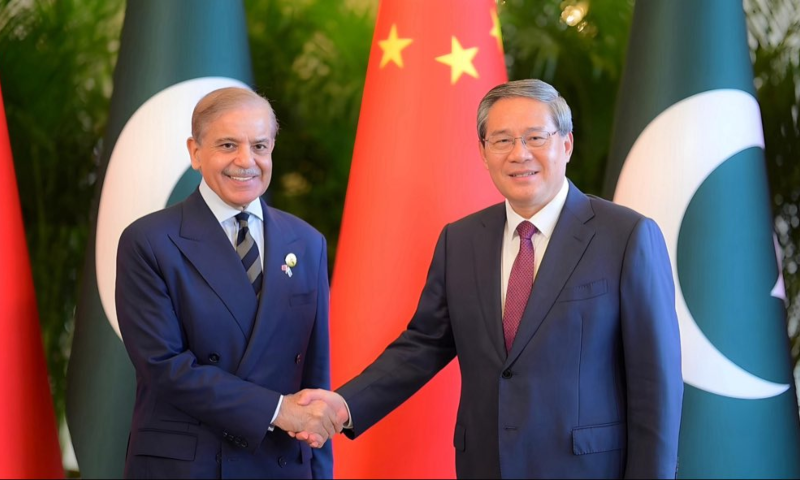Prime Minister Shehbaz Sharif and Chinese Premier Li Qiang reaffirmed on Thursday to work together on the China-Pakistan Economic Corridor’s (CPEC) second phase in a meeting that the former termed “most productive”.
Pakistan and China share a longstanding strategic partnership with ties that span various sectors, including trade, energy, defence, and infrastructure. PM Shehbaz is currently on a six-day visit to China, where he attended the Shanghai Cooperation Organisation (SCO) summit held from August 31-September 1.
“Both sides also agreed to continue working closely on the next phase of upgraded CPEC 2.0, with its five new corridors,” said a statement today by the Press Information Department (PID) following the meeting in Beijing.
The prime minister highlighted the “significant contribution” of the CPEC in Pakistan’s socio-economic development in the past decade. He also stressed the need for early implementation of the Main Line-1 (ML-1) railway project, the Karakoram Highway realignment and operationalisation of the Gwadar Port.
In a post on X, PM Shehbaz termed the meeting “warm and most productive”.
‘I also invited Chinese companies to enhance their investment footprint in Pakistan,“ the premier said, noting the leaders’ agreement on advancing cooperation in information technology, agriculture, minerals, textiles and industry.
PM Shehbaz said: “I thanked the Chinese leadership & the people for their steadfast support to Pakistan’s socio-economic development, particularly through the successful implementation of CPEC, which was now entering its next phase.
“Inspired by President Xi Jinping’s visionary leadership, we remain committed to building a stronger Pakistan-China community with a shared future,” he added.
The PID statement noted the meeting was “warm and friendly”, with both leaders expressing their satisfaction at the positive trajectory of Pak-China relations.
PM Shehbaz expressed his “deepest gratitude to the Chinese leadership and nation for their unflinching support to Pakistan’s territorial integrity, sovereignty, and socio-economic development”.
Both leaders also attended the ceremony of sharing of Memorandums of Understanding (MoUs) and agreements signed related to the “development of CPEC 2.0, science and technology, IT, media, agriculture, etc”.
Recalling the “important consensus” reached between PM Shehbaz and President Xi Jinping in their Tuesday meeting, the statement noted that both premiers reaffirmed their “shared resolve to further strengthen the iron-clad, all-weather strategic cooperative partnership between Pakistan and China”.
“The signing of the Joint Action Plan 2024-2029 was deemed as an important step in this regard.”
The prime minister asserted that the government’s “tireless reform efforts were yielding promising results, made possible through China’s strong support”. In June, China rolled over $3.4 billion in loans to Pakistan to help boost Islamabad’s foreign exchange reserves.
PM Shehbaz also shared Pakistan’s intent to float Panda Bonds, a type of debt security issued by foreign entities denominated in Chinese yuan (RMB), in the Chinese capital market soon.
The prime minister briefed the Chinese premier on the Pakistan-China Business-to-Business Investment Conference held earlier today, where “more than 300 Pakistani and 500 Chinese companies were in attendance”.
He stressed the vast potential for B2B cooperation and investment, identifying agriculture, mines and minerals, textile, industrial sector and IT as priority areas for mutually beneficial economic collaboration.
PM Shehbaz reiterated Pakistan’s support for President Xi’s landmark initiatives to strengthen multilateralism, including the Global Governance Initiative, Global Development Initiative, Global Security Initiative and the Global Civilisation Initiative.
The delegation-level talks were followed by a sumptuous luncheon, hosted by Premier Li in honour of PM Shehbaz and his team, PID added. Both countries would celebrate the 75th anniversary of the establishment of Pak-China diplomatic ties next year, it noted.
The premier’s ongoing visit was expected to mark the formal launch of the second phase of the CPEC-II, which focuses on industrial cooperation.
PM Shehbaz will also meet Chinese Minister for Information Technology and Industry Li Lecheng, the PID said in a separate statement.
He was set to preside over the B2B conference, which was to “review the outcomes of the first edition, chaired by Shehbaz Sharif in Shenzhen in June 2024, and outline future plans”.
On Tuesday, at the sidelines of the SCO summit, PM Shehbaz and President Xi reaffirmed their commitment to strengthening their “iron-clad and all-weather strategic cooperative partnership”.
In his meeting with the prime minister, President Xi pledged support for Pakistan’s home-grown capacity for development, expressing readiness to build CPEC 2.0 and upgrade the China-Pakistan Free Trade Agreement, and step up cooperation in industries, agriculture, and mining sectors.
PM Shehbaz had stressed the “significance of the CPEC as a flagship project of President Xi’s Belt and Road Initiative (BRI) to help both countries to build an even stronger Pakistan-China community with a shared future”.
During his recent address at Tianjin University, PM Shehbaz reiterated that all endeavours and initiatives of the current government of Pakistan “closely align with Chinese President Xi Jinping’s vision and philosophy”.
The government has sent 1,000 agriculture graduates from Pakistan to China to learn modern techniques, while about 30,000 students from Pakistan have been getting education and training in China, the premier noted.
